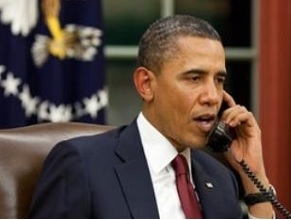|
World Jewish News

US President Obama on the phone [illustrative] Photo: Reuters / White House
|
Obama, Rouhani have first direct contact between US, Iranian leaders since 1979
28.09.2013, Israel and the World US President Barack Obama called Iranian President Hassan Rouhani on Friday, breaking over three decades of cold silence between the leaderships of the two nations.
The two leaders spoke before Rouhani left to return to Tehran after a four-day debut visit to the US to attend the UN General Assembly.
This is the first direct communication between an American and Iranian president since 1979.
"Just now I spoke on the phone with President Rouhani of the Islamic Republic of Iran," Obama said from the White House Friday afternoon. "I reiterated to President Rouhani what I said in New York: While there will surely be important obstacles to moving forward, and success is by no means guaranteed, I believe we can reach a comprehensive agreement."
A senior administration official told reporters that the historic call lasted 15 minutes, opening with Obama congratulating Rouhani on his election and ending with Obama saying farewell in Farsi.
The White House has been in consultation with the Israeli government as well as leaders of Congress over the call.
The two leaders spoke through interpreters, as is commonplace among foreign leaders, the official said.
On Tuesday, the Iranian government declined a US offer for the two presidents to meet briefly on the sidelines of the United Nations General Assembly in New York. US officials said they believe an in-person meeting would have been politically complicated for the new leader, who was inaugurated in August after winning the Iranian presidency campaigning on the prospect of better relations with the West.
"We learned earlier today from the Iranians that Rouhani... wanted to speak by phone before he left for Iran," the official said.
In the call, Obama noted that a breakthrough on the nuclear issue could open the door to "deeper relations" with the Islamic Republic.
"Iran’s supreme leader has issued a fatwa against the development of nuclear weapons. President Rouhani has indicated that Iran will never develop nuclear weapons. I’ve made clear that we respect the right of the Iranian people to access peaceful nuclear energy in the context of Iran meeting its obligations," he said.
Obama said he will seek "transparent, meaningful and verifiable actions" on the Iranian nuclear program, which could also bring relief in Western sanctions imposed on the Islamic Republic.
He noted that both he and Rouhani have instructed their teams to continue working expeditiously with P5+1 to reach an agreement.
"We have a responsibility to pursue diplomacy and... we have a unique opportunity to make progress with the new leadership in Tehran," he told reporters.
Obama also expressed concern with three Americans still held in captivity in Iran.
"The substance of this negotiation is going to take place through the P5+1," the official added, given the "technical" hurdles that must be overcome.
The call comes just days before Prime Minister Binyamin Netanyahu is to travel to New York and Washington to make his case against Iran's nuclear program, both publicly and privately.
"We'll continue to keep the Israeli government updated on this diplomatic effort," the official said. "The Israeli government has every right to be skeptical of the Iranian government, given... threats toward Israel's existence."
But a "meaningful, transparent and verifiable" agreement would benefit Israel, the official added, as it would the United States.
On the call with reporters, the official said that the Syrian deal achieved in the Security Council this week, which will rid Bashar Assad of his chemical weapons stockpile, "went beyond" the strategic objective of a planned military strike against Syria by the United States.
"Neither [development] could have been foreseen a month ago," the official said.
By MICHAEL WILNER. JPost.com staff contributed to this report.
JPost.com
|
|
